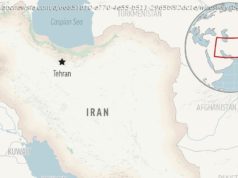For his exit from the Trump administration, Michael Anton, a self-described “right-wing Francophile,” asked to work as a line cook helping to prepare dinner for the French president.
WASHINGTON — In the ceaseless churn of the Trump administration, there are many ways to leave the White House. Lt. Gen. H. R. McMaster, the ousted national security adviser, exited to the applause of colleagues who lined the West Wing parking lot. Reince Priebus ducked, alone, into a car on a rain-slick tarmac after being tossed out as chief of staff.
But nobody has matched the valedictory of Michael Anton, who ended a roiling 14-month stint at the National Security Council on Tuesday by cooking dinner for the president of France.
Mr. Anton, a classically trained chef who favors French cuisine, resigned on April 8 in a phone call with President Trump, the night before General McMaster’s successor, John R. Bolton, started work.
As he packed up his office the next day, he made a special request of the current chief of staff, John F. Kelly: that he be allowed to come back for a day to work as a line cook in the White House kitchen, helping to prepare Mr. Trump’s state dinner for President Emmanuel Macron and his wife, Brigitte.
At first bewildered by the request, Mr. Kelly readily gave his blessing.
So on Tuesday morning — clad in starched chef’s whites and wielding a knife — Mr. Anton, 48, stood at a table in the middle of a compact, busy kitchen, rows of silver pots hanging behind him. He expertly sliced rows of tiny crescent-shaped puff pastries that would be used to make shrimp canapés.
Around him, the kitchen was a tarantella of activity: four cooks grilled rack of lamb, another rinsed lettuce and yet another arranged grilled vegetables on a platter. A television on the wall was tuned to CNN, with images of Mr. Trump welcoming Mr. Macron to the Oval Office — a constant reminder of the approaching dinner bell.
“I’m a rare thing in Washington conservative circles: a right-wing Francophile,” said Mr. Anton, who first served in the White House during the George W. Bush administration, when the Iraq war curdled relations with Paris. “It makes it a special honor that I didn’t merely cook at the state dinner, but of all people, I cooked for the president of France.”
“We’ve come a long way since freedom fries,” he added.
Even in a White House of motley personalities, Mr. Anton stood out. Tall and trim, with bespoke suits, suspenders and crisply folded pocket squares (he once wrote a how-to book on men’s fashion under the nom de plume Nicholas Antongiavanni), he was a dandy in a sea of ill-fitting, rumpled suits (think Stephen K. Bannon or Sean Spicer).
His colleague Raj Shah, a deputy press secretary, once joked to colleagues that Mr. Anton turned down an invitation to the Gridiron Dinner, a white-tie evening that is his kind of event, because it would require renting tails, and he refused to wear anything that was not custom tailored. Mr. Shah’s colleagues thought he was serious.
Mr. Anton is also a prolific essayist who flavors his writing with references to Gibbon and Montesquieu. He is most famous for a polemical article he published in September 2016 in the Claremont Review of Books, “The Flight 93 Election,” which became an unlikely, highbrow manifesto for Mr. Trump’s election.
“Charge the cockpit or you die,” he wrote, this time under the pseudonym Publius Decius Mus. “A Hillary Clinton presidency is Russian roulette with a semi-auto. With Trump, at least you can spin the cylinders and take your chances.”
His argument for a Trumpian assault on the nation’s elites, conservative and liberal alike, was a sensation on the right. When Mr. Trump’s aides recruited him to be director of strategic communications for the National Security Council, Vanity Fair and The Weekly Standard portrayed him as an enigmatic figure — a thinking man’s Beau Brummell among the philistines of Trump world. “The most interesting man in the White House,” Yahoo News said.
And that was without the cooking.
Mr. Anton dates his interest in French cuisine to graduate school at St. John’s College in Annapolis, Md., where, he says, he cooked the recipes in Julia Child’s “Mastering the Art of French Cooking,” years before Julie in the Nora Ephron film “Julie & Julia.” He worked as a vegetable cutter at a local restaurant, Treaty of Paris, and told his parents he wanted to drop out and go to culinary school (they vetoed that plan).
He honed his cooking while working in the Bush White House, once losing a half-finished demi-glace sauce — a three-day project — when the national security adviser called him from the Situation Room and told him to get to the office immediately. “Down the drain it all had to go,” he wrote in a 2014 essay, “the wages of divided loyalty.”
Living in New York during the Obama years, Mr. Anton decided to get serious about cooking. He took classes at the French Culinary Institute (now known as the International Culinary Center) in Lower Manhattan, and worked, unpaid, as a line cook at L’Ecole, a French restaurant that was affiliated with the institute.
“You got yelled at for screwing up,” he recalled. “But I liked the fact that they didn’t let you get away with things.”
That turned out to be useful experience for the Trump White House, which can mimic the high-decibel chaos of Gordon Ramsay’s kitchen. Mr. Anton survived the ouster of his first national security adviser, Michael T. Flynn, and several other colleagues. He developed a rapport with General McMaster, a barrel-chested Army officer whose tastes ran to beer rather than wine but who shared Mr. Anton’s love of writing.
Despite his sometimes irascible style, Mr. Anton’s colleagues viewed him affectionately. “Every day I got to work with Michael was a good day,” said the press secretary, Sarah Huckabee Sanders.
General McMaster’s relationship with Mr. Trump, however, was a soufflé that never rose. After he was forced out in favor of Mr. Bolton, Mr. Anton decided to leave rather than risk a similar fate. He announced plans to join the Kirby Center, the Washington outpost of Hillsdale College, a conservative school in Michigan, where he will write and lecture.
But there was that last bit of unfinished business.
Mr. Anton had his dress rehearsal in February when Mr.
Home
United States
USA — mix A National Security Aide’s Departing Wish: Cooking for the State Dinner






